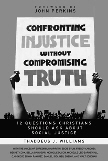Confronting Injustice Without Compromising Truth: 12 Questions Christians Should Ask About Social Justice -- By: Grant Castleberry
Journal: Eikon
Volume: EIKON 04:1 (Spring 2022)
Article: Confronting Injustice Without Compromising Truth: 12 Questions Christians Should Ask About Social Justice
Author: Grant Castleberry
Eikon 4.1 (Spring 2022) p. 153
Confronting Injustice Without Compromising Truth: 12 Questions Christians Should Ask About Social Justice
REVIEWED BY
Grant R. Castleberry is senior pastor of Capital Community Church in Raleigh, North Carolina. He is currently writing a Ph.D. thesis on Dr. D. Martyn Lloyd-Jones’s doctrine of unity at the Union School of Theology in Wales. He also served as Executive Director of CBMW from 2014 to 2017.

Thaddeus J. Williams. Confronting Injustice without Compromising Truth. Grand Rapids, MI: Zondervan, 2020.
Over the past ten years, many neo-Marxist ideas have been smuggled into the church under the cover of the Trojan horse of “social justice.” Of course, Christians should care about justice and walk humbly before God, living righteously in the world (Mic. 6:8). Furthermore, we are to “love our neighbor as ourselves” (Matt. 22:39). But we must be careful to do this with biblical discernment and the “mind of Christ” and not with the methods of the world that oppose God’s Word. This is the crux of the issue and why so much of the church is struggling with “social justice.” Enter Thaddeus Williams’ Confronting Injustice Without Compromising Truth, which tackles all the major justice issues of the day from a biblical worldview.
Let me say at the outset that this is truly a fantastic book. Williams has probably written
Eikon 4.1 (Spring 2022) p. 154
the best introductory primer that covers all the major justice issues of the day. With a biblical framework and careful use of logic, he demonstrates how to approach issues of justice with godly discernment. Williams makes an important point when he says that we “take the Bible’s commands to be discerning just as seriously as we take its commands to do justice” (192). The neglect of this point has been the failure of the modern church and is exactly why this book deserves a wide reading amongst evangelicals.
Williams tackles head-on the justice issues of sexuality, intersectionality, critical theory, socialism, identity politics, personal vindication, propaganda, abortion, and racism. And he does so by contrasting what he calls “Side A,” which is the biblical perspective on a justice issue with “Side B,” which is the world’s perspective on a justice issue. For example, take the often used term “systemic injustice.” Williams rightly defines it biblically (Side A) as “any system that either requires or encourages those within the system to break the moral laws God revealed for his ...
Click here to subscribe
